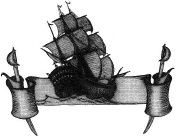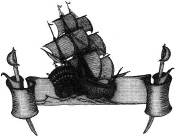Peter and the Shadow Thieves (17 page)
Read Peter and the Shadow Thieves Online
Authors: Dave Barry,Ridley Pearson
Tags: #Juvenile Fiction, #General, #Action & Adventure

“No,” said Smee. “I mean, yes.”
Hook sighed the heavy sigh of a great man doomed to go unworshipped by the fools around him. “Just get the men, Smee,” he said. “With spears and the net.”
“Aye, Cap’n,” said Smee, and he trotted off, muttering, “spears and the net; spears and the net,” so as not to forget.
Hook watched him go, then returned his gaze to his drawing and his bril iant plan for getting rid of the cursed boys once and for al .



ST. KATHERINE’S DOCK
S
LOWLY, LABORIOUSLY, pushed by the tide with little help from a weak, fast-fading wind, the ship inched the last half mile to its berth in London.
At
last,
Nerezza thought. He had never been so grateful to reach port. Since they’d left the strange island, he’d had little sleep. The crew, already unsettled by the presence of Lord Ombra, had been made even more skittish by strange shipboard occurrences. First, there had been the mysterious stowaway who’d gone overboard but left troublesome questions behind. Who was he? How and where had he boarded the ship? And what would compel him to jump from a ship—a ship
in the middle of the ocean
—rather than al ow himself to be caught?
And then there was the mysterious light. Crewman after crewman claimed to have seen it: a smal , quick light flitting about the ship, sometimes in the rigging, sometimes on the deck, often around the scuttlebutt. Nobody got near it, or even got a good look at it; whatever it was, it moved too fast.
The sailors, being as superstitious as most crews, had decided that it was the ghost of the drowned stowaway. Nerezza forbade such talk, loudly declaring that he would keelhaul any man who so much as spoke the word “ghost.” But that did not quiet the anxious mutterings.
It did not help that Ombra had displayed a keen interest in these rumors, constantly demanding reports on al sightings of anything unusual, and prowling the deck at night, searching, searching…for what, Nerezza did not know. But he did know this: it kept him from getting much sleep.
Slank, too, was very interested in the ghost reports, and especial y the mystery of the stowaway. Several times he had badgered the cook for a description of the fleeing figure, asking over and over: “Was it a boy? Could it have been a
boy
you saw?” The cook could give no satisfactory answer, protesting that he’d barely seen the figure. But Slank would not let go of it, and his relentless suspicion added to the shipboard tension.
And so Nerezza was grateful when, at last, London came into view. He stood on deck now, feeling the damp, cold air seep through his overcoat as the ship eased forward on the dark waters of the Thames—waters swarming with traffic, boats and ships of every size bearing flags from dozens of countries.
In the distance lay London’s familiar landmarks—the Tower, Tower Bridge, Parliament—looking majestic even in the coal-clouded air. On the right lay the vast, busy complexity of the London docks, a forest of masts rising from hundreds of ships. Nerezza spotted the red brick of Hardwick’s Warehouses.
“We’l put in to St. Katherine’s,” Nerezza announced to his first mate, who had been expecting this and quickly relayed the orders to the crew. “Look alive, now!” he shouted, though this was hardly necessary: the sailors were eager to get off the haunted ship and onto shore.
Far above, in the folds of the furled sail that had been both his hammock and hiding place for far too long, Peter eagerly awaited getting off this ship. He was hungry, having eaten nothing for two days but an old piece of meat that was mostly bone. He was also tired, having slept poorly from worrying constantly about being discovered. And he was deeply troubled by Tinker Bel ’s accounts of the mysterious dark form that prowled the deck below each night.
The day before, his heart had leaped as he’d heard the lookout’s long-awaited cal of “LAND HO!” From then on, England had been a dark line off to port; France, the same to starboard. From time to time, he’d cautiously poked his head over the top of the sail, marking the ship’s progress as it drew slowly closer to its destination. He’d heard the sailors cal ing out the names of the landmarks: Isle of Sheppey, Canvey Island, the ominously named Gravesend, and final y the entrance to the river Thames. Now, at last, he could see the quay and docks themselves, and the huge fleet of ships in various stages of loading and unloading.
But he could see his breath, as wel . For in addition to his other miseries, Peter was cold, bitterly cold. He had nothing to protect himself from the damp North Sea chil but the rags he wore and the rough canvas of the sail. He shivered constantly, longing for the warm sun and gentle tropic breezes of Mol usk Island—so far away now.
Less than a year earlier, Peter and the other boys had stood on one of these docks, about to go to sea aboard a doomed old tub carrying a mysterious trunk and a strange little girl. To Peter, that seemed like a lifetime ago. He was a very different person now from the cocky, selfish boy who’d left England. His life had changed dramatical y on that voyage, and on Mol usk Island. He had ful y expected to remain in his new home forever.
But now here he was, back where he’d started, his life once again intertwined with Mol y’s. He had to find her. But how? Peter looked out at the teeming docks, where hundreds, no, thousands of people—sailors, dockworkers, tradesmen, naval officers, customs officials, and more—scurried back and forth. Beyond them, Peter saw the impenetrable immensity of London—a confusing jumble of rundown, rickety buildings stretching into the dark distance, as far as he could see.
How would he find Molly
?
Peter knew nothing of London—he’d never even been in the city before that fateful morning when the carriage had delivered him and the other boys from St. Norbert’s Home for Wayward Boys to the docklands. He had no family in London, and—aside from Mol y and her father—-no friends. He had no money. He had no coat. He didn’t even have shoes.
How would he find Molly
?
Peter shivered. He had no plan at the moment. He knew only that he must find her, and quickly, before the hard men on the deck below got to her.
The dock was close now. There was much shouting and activity on the ship as its crew prepared to heave lines and tie the ship up. Peter hazarded a peek down at the deck.
Directly below, standing next to the mast from which Peter’s sail was suspended, was the captain, Nerezza—he of the hideous wooden nose—adjacent to Slank. Peter flinched involuntarily at the sight of Slank, who, Peter knew, would like nothing better than to slit the throat of the boy who had bested him back on Mol usk Island.
Slank and Nerezza talked quietly. Peter strained to hear, wishing he knew what they were saying.
“Tink,” he whispered.
What
? came the answer, soft bel s in his ear.
“Do you think you can get close to those two men down there without being seen?”
Tink peeked down.
You mean Wood Nose and Ugly Face
?
Peter had to smile. “Yes, them.”
I’ll go down the back of this pole,
she said, pointing to the mast.
They won’t see me.
“Al right,” whispered Peter. “See if you can find out what they’re saying. But be care—”
He didn’t finish, for Tink was already gone. Hoping he hadn’t made a stupid mistake in sending her, Peter hid himself, settling back into the sail, worrying and waiting. And shivering.
“Keep the crew on board?” Nerezza asked, astonished. “Is he mad? We reach London after several
months
at sea, with only a few measly hours on that wretched island, and he wants me to deny shore leave and
keep the crew on board
?”
“That’s Ombra’s orders,” said Slank, who had just spent an uncomfortable twenty minutes below in Ombra’s night-dark cabin. “He don’t want word of his presence to get out until he’s done with the Asters.”
“Al right, then,” said Nerezza reluctantly. “There’l be no shore leave ’til Ombra says so.” The orders, when relayed by the first mate, brought sour faces and some angry murmurs, but the crewmen valued their skins too much to express their feelings aloud with Nerezza watching.
With the ship tied securely now, a gangplank was run out to connect the deck with the dock.
“There they are,” Slank said, nudging Nerezza. “Right on time.”
Two men stood off to the side of the gangplank, one tal and lean—hatchet-faced with dark, close-set eyes under bushy brows. Wearing an overcoat, woolen trousers, and the top hat of a gentleman, he looked out of place amid the squalor and bustle along the stone quay. Next to him, not quite so tal , stood a man wearing the black uniform of a Metropolitan police officer. The uniform, both Nerezza and Slank noticed, did not fit him wel , being too short in both the sleeves and the pants legs.
“That’s them? You’re certain?” said Nerezza.
“I am,” said Slank. He raised his hand, winning the attention of the two men on the dock, and gestured for them to ascend the gangplank. This they did with the deliberate steps of landsmen uncertain of their footing on a ship.
They approached the quarterdeck, stopping at the mizzenmast, alongside of which Slank made the introductions.
“Captain Nerezza,” he said, “this here is Mister Gerch”—he nodded toward the gentleman—“and this here is Mister Hampton. Or, should I say, Constable Hampton.” Nobody smiled at the attempted humor. Nor were any handshakes exchanged.
“Is he here?” inquired Gerch, not one to waste time on pleasantries with those he perceived to be of inferior social standing.
“Belowdecks,” said Slank.
“He don’t come out in the daylight,” said Nerezza.
“Al right,” said Gerch. “Then you tel him this. Aster’s gone.”
“
Gone
?” said Slank, alarmed. “Gone where?”
It was Hampton who answered: “We don’t know. We have somebody inside, a girl on the household staff, that says Aster left a week ago and hasn’t been back since.”
“What about the daughter?” said Slank.
“She’s stil there, with her mum,” said Hampton.
This drew an ugly smile from Slank. “He left the women, did he?” he said. “Then I’d say we’ve got him.”
“There are three guards,” said Hampton. “Big ones. And a dog.”
“The guards wil not be a problem,” said Nerezza.
Slank nodded his agreement, remembering the warrior guards back on Mol usk Island.
“So,” said Gerch, “how does the…how does your passenger wish to proceed?”
“You’re to come back at nightfal ,” said Slank.
Gerch said, “Then what?”
“Then our passenger comes up and tel s us what we do next,” said Slank. “He’s not much for revealing his plans ahead of time, but if I had to guess, I’d say we’re going to pay a cal on Lord Aster’s wife and daughter.”

